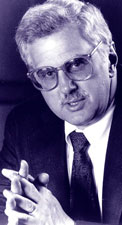URL: http://www.nature.com/cgi-taf/DynaPage.taf?file=/nature/journal/v408/n6814/full/408759b0_fs.html
Date accessed: 06 February 2001
Nature 408, 759 (2000) © Macmillan Publishers Ltd.
![]() 14
December 2000
14
December 2000
PAUL SMAGLIK
Science magazine has released details of the terms under which it
plans to publish Celera Genomics' paper on the human genome — and drawn sharp
criticism over the limits that the terms set on data access. Celera and Science have agreed that publicly funded scientists can
download up to one megabase of data without signing a material transfer
agreement. But privately funded users must sign such an agreement stating that
they will not commercialize their results or redistribute the data. The arrangement has potentially profound significance, some researchers say,
because it could set a precedent for scientists to publish papers without
unencumbered access to supporting data. "What will happen if someone else from the academic sector says, 'I have
an interesting result to report, but I can't give you all the data'?" asks
Harold Varmus, president of the Memorial Sloan-Kettering Cancer Center and
former National Institutes of Health director. Varmus was one of several
scientists who advised Science on the terms. But the advisers are not all
in agreement with the announced policy, he says.
Bruce Alberts: deal won't work for private sector. But this week, Alberts — who says that the statement reflected his own
views, not those of the academy — backed off from this. In an interview, he
said that the deal could work for publicly funded scientists, but that the terms
for private ones appear unworkable. "The data should be available both to
the public sector and private," he says. The agreement has drawn vocal criticism from some researchers. Ewan Birney,
team leader of genomic annotation with the European Bioinformatics Institute in
the UK, co-authored an open letter to bioinformaticians attacking the
arrangement. He says it is problematic for computational biologists, because
they work with large data sets, whose transfer is restricted by the agreement.
"This deal is bad for bioinformatics, but palatable for single gene
biology," Birney says.
When the agreement was announced, Bruce Alberts, president of the National
Academy of Sciences, issued a brief statement of support, saying that it may
serve as a way to prompt more companies to make their genomic data available.

![]() http://www.sciencemag.org/feature/data/announcement/genomesequenceplan.shl
http://www.sciencemag.org/feature/data/announcement/genomesequenceplan.shl
Categories: 16. Economics and Biotechnology, 32. Genome Project